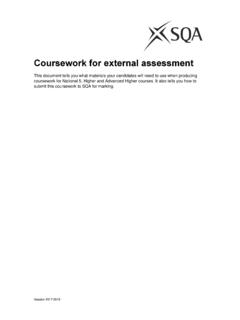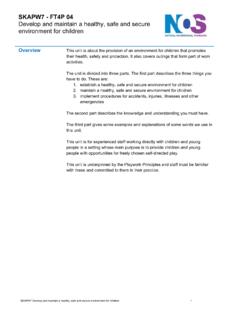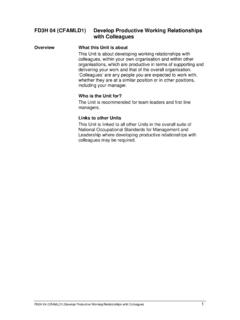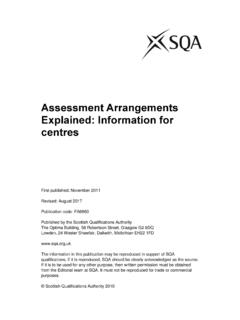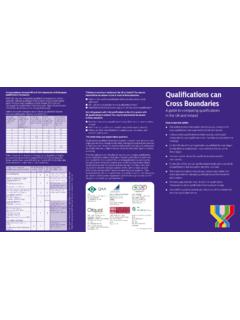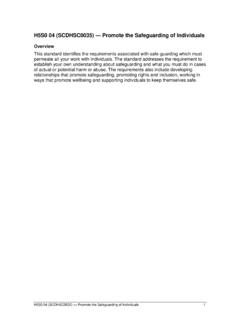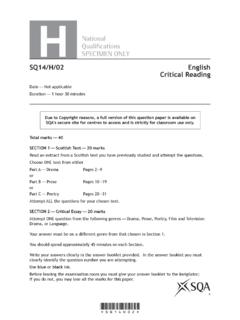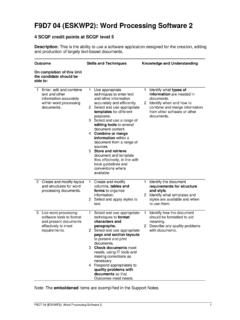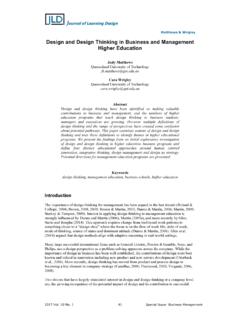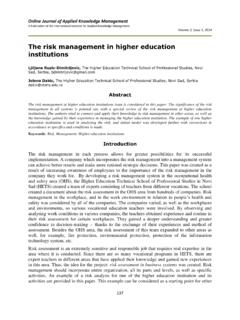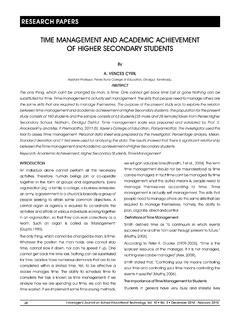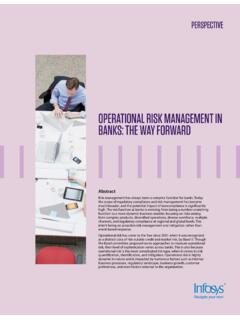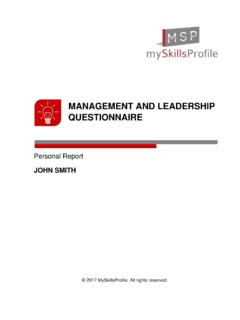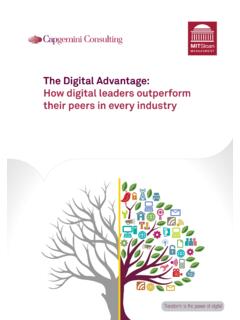Transcription of Higher Business Management - SQA
1 Higher Business Management Course code: C810 76 Course assessment code: X810 76 SCQF: level 6 (24 SCQF credit points) Valid from: session 2018 19 This document provides detailed information about the course and course assessment to ensure consistent and transparent assessment year on year. It describes the structure of the course and the course assessment in terms of the skills, knowledge and understanding that are assessed. This document is for teachers and lecturers and contains all the mandatory information you need to deliver the course. The information in this publication may be reproduced in support of SQA qualifications only on a non-commercial basis. If it is reproduced, SQA must be clearly acknowledged as the source.
2 If it is to be reproduced for any other purpose, written permission must be obtained from This edition: May 2018 (version ) Scottish Qualifications Authority 2013, 2018 Contents Course overview 1 Course rationale 2 Purpose and aims 2 Who is this course for? 2 Course content 3 Skills, knowledge and understanding 3 Skills for learning, skills for life and skills for work 8 Course assessment 9 Course assessment structure: question paper 9 Course assessment structure: assignment 10 Grading 13 Equality and inclusion 14 Further information 15 Appendix: course support notes 16 Introduction 16 Developing skills, knowledge and understanding 16 Approaches to learning and teaching 17 Preparing for course assessment 40 Developing skills for learning, skills for life and skills for work 40 Version 1 Course overview The course consists of 24 SCQF credit points which includes time for preparation for course assessment.
3 The notional length of time for candidates to complete the course is 160 hours. The course assessment has two components. Component Marks Duration Component 1: question paper 90 2 hours and 45 minutes Component 2: assignment 30 8 hours see Course assessment section Recommended entry Progression Entry to this course is at the discretion of the centre. Candidates should have achieved the National 5 Business Management course or equivalent qualifications and/or experience prior to starting this course. Advanced Higher Business Management course other qualifications in Business Management or related areas further study, employment and/or training Conditions of award The grade awarded is based on the total marks achieved across all course assessment components.
4 Version 2 Course rationale National Courses reflect Curriculum for Excellence values, purposes and principles. They offer flexibility, provide time for learning, focus on skills and applying learning, and provide scope for personalisation and choice. Every course provides opportunities for candidates to develop breadth, challenge and application. The focus and balance of assessment is tailored to each subject area. Business plays an important role in society, as it creates wealth, prosperity, jobs, and choices for consumers. It is therefore essential to have effective businesses and Business managers to sustain this role. This course helps candidates understand the dynamic, changing and competitive environment of industry and commerce, and the environments that organisations operate in.
5 It develops skills in communicating and presenting Business -related information to stakeholders of an organisation. Purpose and aims The course highlights the different ways in which large organisations operate. Candidates learn to understand and make use of Business information to interpret and report on overall Business performance, in a range of contexts. Using current Business theory and practice, the course reflects the integrated nature of large organisations, their functions and decision-making processes. Candidates develop understanding of: the ways in which society relies on organisations and how external influences can affect them a range of methods that businesses and other organisations use to meet customer needs enterprising skills and attributes how to analyse and interpret Business information and communicate it in a clear and concise way Who is this course for?
6 The course is suitable for candidates who are interested in entering the world of Business , as a manager, employee or self-employed person, and exploring the activities of different types of Business . Version 3 Course content The course consists of five areas of study: Understanding Business Candidates develop their understanding of how large organisations in the private, public and third sectors operate, make decisions and pursue their strategic goals. They analyse the impact that internal and external environments have on an organisation s activity, and consider the implications of these factors. Management of marketing Candidates develop their understanding of the importance of effective marketing systems to large organisations.
7 They learn about the relevant theories, concepts and procedures used by organisations to improve competitiveness and customer satisfaction. Management of operations Candidates develop their understanding of the importance of effective operations systems to large organisations. They learn about the relevant theories, concepts and procedures used by organisations to improve and/or maintain quality, and the importance of satisfying both internal and external customers needs. Management of people Candidates develop their understanding of the issues that large organisations face when managing people. They learn about the relevant theories, concepts and procedures used by organisations when dealing with staff, including retention, training, leadership and motivation.
8 Management of finance Candidates develop their understanding of the issues that large organisations face when managing finance. They learn about the relevant theories, concepts and procedures used by organisations in financial situations. Skills, knowledge and understanding Skills, knowledge and understanding for the course The following provides a broad overview of the subject skills, knowledge and understanding developed in the course: applying knowledge and understanding of the impact of Business activities on society, in contexts which have complex features applying the ideas of ethical and effective Business decision making to solve strategic Business -related problems communicating relatively complex Business ideas and opinions from a range of information relating to the effects of opportunities and constraints on Business activity.
9 Some of which may be unfamiliar understanding how entrepreneurial attributes can help Business development and risk Management Version 4 analysing the effectiveness of a range of marketing activities and understanding how they can be used to enhance customer satisfaction analysing a range of activities which can be used during the production process to maximise the quality of goods/services understanding leadership styles and how they can be used to enhance the contribution of staff to Business success analysing Business financial data to draw conclusions and suggest solutions where appropriate analysing the use of existing and emerging technologies to improve Business practice Version 5 Skills, knowledge and understanding for the course assessment The following provides details of skills, knowledge and understanding sampled in the course assessment.
10 Understanding Business Role of Business in society sectors of industry sectors of the economy Types of organisations public sector organisations private limited companies public limited companies franchising multinationals third-sector organisations Objectives corporate social responsibility growth satisficing managerial objectives Methods of growth organic horizontal vertical (forwards and backwards) lateral conglomerate diversification External factors impact of PESTEC external factors, including economic and competition policy Internal factors corporate culture availability of finance staffing technology Stakeholders conflicts of interest and interdependence Structures features, benefits and drawbacks of different organisational structures Decision making types of decisions quality decisions SWOT analysis role of a manager Version 6 Management of marketing Customers market-led versus product-led consumer behaviour Market research market research methods (including justification for use)
